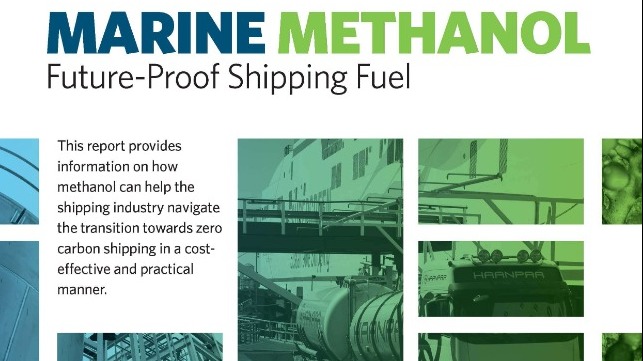Methanol Institute Publishes 1st Guide to Methanol as a Marine Fuel

[By: The Methanol Institute]
The Methanol Institute (MI) has published the first comprehensive guide to methanol as a marine fuel. As the shipping industry continues its transition towards net carbon neutral operations, owners are increasingly choosing methanol as a fuel that can help them progressively reduce emissions in line with regulatory targets.
‘MARINE METHANOL Future-Proof Shipping Fuel’ has been produced to help stakeholders across the industry access the information they need to support decision-making on which alternative fuel is right for their fleet.
Sections of the report address regulatory drivers, environmental performance, engines and fuel systems, bunkering, handling and safety characteristics, costs and pricing, availability and feedstocks for conventional and renewable product. Also included are case studies on first movers including AP Moller-Maersk, Waterfront Shipping, Proman Stena Bulk and the conversion of ropax ferry Stena Germanica.
The orderbook for methanol fuelled ships has grown rapidly with owners and operators specifying the fuel for use on ships from the largest containerships to small pilot boats. In between is the growing fleet of methanol carriers, bunker tankers, bulk carriers, heavylift vessels, cruiseships, ferries and superyachts.
Approved for use as fuel under the IMO’s IGF Code, the momentum for methanol as fuel has increased as studies, analysis and guidance - much of it supported by the Methanol Institute - has been published. This includes early guidance for bunkering operations developed with Lloyd’s Register and subsequent work with the ports of Shanghai, Singapore and Rotterdam. Propulsion systems include tried and tested two-stroke main engines, four stroke units, and fuel cells using methanol for conversion to hydrogen. Main engine manufacturers report considerable order backlogs and are developing ever larger, higher capacity units. Studies and pilots continue to prove the effectiveness of converting smaller main engines to methanol operations.
“Methanol has staked a significant claim to be among the serious fuel choices for vessel designers, owners and operators looking to make a start on their transition to sustainable operations,” said MI Chief Executive Officer Greg Dolan. “While there won’t be a single decarbonization solution, it is clear that methanol has advantages that combine to provide a pathway to lower carbon and ultimately carbon-neutral operations; This report provides a clear roadmap for this journey.”
“Shipowners have recognised that methanol provides them with huge flexibility in introducing a low-pollution, lower carbon fuel which is closest to a drop-in available in the market,” said MI Chief Operating Officer Chris Chatterton. “The decision by more and more leading shipping companies to adopt methanol as fuel signals that the industry recognises the need to start its transition to net carbon neutrality now; this publication can support their decision-making process.” To download the guide, please click here.
For more information, please visit www.methanol.org.
The products and services herein described in this press release are not endorsed by The Maritime Executive.
